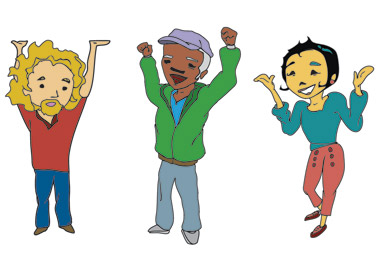I confess: while I thought Co-opoly an interesting concept, I didn’t have high hopes that the board game would be much fun.
I enjoy games that simulate real-world situations, but mostly I’m looking for opportunities to explore scenarios I’m not likely to encounter in the real world: trying to conquer the globe, or being the captain of a pirate ship. That kind of thing. Trying to keep a co-op afloat sounded entirely too much like work.
Despite being impressed by the game’s clean and engaging design, I let out a little scream when I saw how many components there were and how much tiny text was involved.
I’d been planning on testing Co-opoly with my buddies during our regular Friday game night. But did I really want to sully my favorite night of the week trying to keep an imaginary business afloat?
My fellow gamers were equally apprehensive. Several game nights came and went with Co-opoly never coming out of its box. Eventually we decided to preserve the sanctity of our Fridays by giving the game a go on a weeknight.
Despite the number of pieces involved, setup turned out to be quick and easy. While there is a lot of text on the game cards, the rules were simple, well organized and clear.
Before beginning, players select character cards that determine their cost of living. The game recommends players come up with a backstory for their characters and, as a group, decide what kind of fictional co-op they are running. Though this step isn’t required, we found this helped make us more invested, as well as offering more opportunity for witty madcap hijinks.
There are a good number of board games on the market that feature cooperative play in which players win or lose as a group. In some cases, though, instead of eliminating competition and affording everyone an equal opportunity to participate, the game fosters the emergence of leaders who make the decisions while others acquiesce.
Co-opoly avoids this with a balance between group deliberation and personal responsibility. Moving the same piece around the board, each player takes a turn reading challenge cards that offer options for taking on the kinds of issues that real co-ops face—like investing in new equipment or looking for professional arbitration during disputes.
If the group decides to take on a challenge, the person who reads the card needs to get everyone else to guess a word by playing a variety of traditional parlor games, including charades.
The first time we tried Co-opoly, we were perhaps too cavalier. We took on every challenge presented, and even before we got to our first payday, we found our co-op destitute. We weren’t making enough to keep the business going or pay ourselves.
As a group, it was our consensus-driven decision that the best strategy was to start cheating and steal money from the bank.
To ease our guilt, we agreed we’d pay back the money when we had it. But that never happened. Our crime spree became a spiral. We got around the board once (completing a year in game time), but our reckless lifestyle couldn’t last. It got so that we couldn’t even steal enough to win.
With a high level of accuracy and entertainment value, the game had simulated a real-world situation convincingly. Our careless, high-risk approach to running the co-op had resulted in its early demise. We ended the game earlier than we had expected. We felt defeated, but not willing to quit. We wanted another chance.
Unanimously, we decided that next game night, we’d give Co-opoly our undivided attention. It almost whipped us twice, but I’m glad to say our second co-op prospered and we’re looking forward to trying again.
*
For a story on the origins of both Co-opoly and Monopoly, click here.



